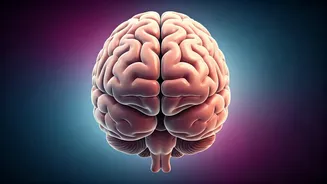The Vital Vitamin B12
Vitamin B12 is crucial for several key bodily functions. It plays a significant role in nerve function, DNA synthesis, and red blood cell formation. This
essential nutrient is naturally present in animal products, like meat, fish, eggs, and dairy, but it's not readily available from plant sources. Therefore, those following vegetarian or vegan diets, or individuals with certain medical conditions, may be at a higher risk of deficiency. The human body does not produce B12 on its own, so it must be obtained through the diet or supplementation. Understanding the importance of B12 is the first step in addressing any potential health issues.
Fatigue and Weakness
One of the most common symptoms of B12 deficiency is persistent fatigue and weakness. This is because B12 helps in the formation of red blood cells, which carry oxygen throughout the body. Without sufficient B12, the body produces fewer red blood cells, resulting in a condition known as anemia. Anemia causes the body to receive less oxygen than it requires, leading to increased tiredness and overall weakness. These effects can significantly reduce a person's ability to perform daily activities. Sometimes people may overlook the symptom, attributing it to stress or overwork, so recognizing it as potentially related to a B12 deficiency can prompt more comprehensive testing.
Neurological Symptoms
Vitamin B12 is essential for maintaining a healthy nervous system. Therefore, a deficiency can manifest in various neurological symptoms. These may include tingling or numbness in the hands and feet, known as peripheral neuropathy. Additionally, a person could have difficulty with balance and coordination. Some people may also experience cognitive difficulties, such as memory loss, confusion, and difficulty concentrating. In severe cases, a B12 deficiency can even lead to more serious neurological problems. Prompt diagnosis and treatment are crucial to prevent any potential permanent nerve damage.
Mental Health Mimicry
The effects of Vitamin B12 deficiency often mimic mental health disorders. People deficient in B12 frequently experience symptoms that include depression, anxiety, and mood swings. These symptoms can be attributed to the vitamin's role in the production of neurotransmitters, which are chemicals that transmit signals in the brain. When B12 levels are low, this process is affected, leading to mood disorders. Sometimes, people are misdiagnosed with mental health conditions. Understanding the connection between B12 deficiency and mental health can help ensure proper diagnosis and support.
Gastrointestinal Issues
B12 deficiency can also impact the digestive system, as B12 is involved in maintaining the health of the gut lining. Symptoms may include loss of appetite, weight loss, and digestive problems like diarrhea or constipation. These symptoms might be due to the decreased production of stomach acid, which is needed to absorb B12. Moreover, a deficiency can also cause a sore and inflamed tongue (glossitis). If gastrointestinal issues are present along with other symptoms, it can raise the suspicion of B12 deficiency.
Who's Most At Risk?
Certain groups are more susceptible to Vitamin B12 deficiency. Vegans and vegetarians are at higher risk because B12 is mainly found in animal products. Those with conditions affecting nutrient absorption, like Crohn's disease or celiac disease, are also more vulnerable. Older adults often have lower B12 absorption due to reduced stomach acid production. Moreover, those who have undergone weight loss surgery may also have a higher risk. Individuals taking medications that interfere with B12 absorption, such as proton pump inhibitors (PPIs) used for acid reflux, should also be aware of the potential risks.
Diagnosis and Testing
Diagnosing a Vitamin B12 deficiency involves a blood test. This test measures the level of B12 in the blood. Sometimes, other tests are performed to determine the severity and the underlying cause of the deficiency. These may include tests for other markers, like homocysteine, or intrinsic factor antibodies. Identifying the cause is vital for developing an effective treatment plan. If symptoms suggest a deficiency, a healthcare provider can order the appropriate tests. Early detection helps in prompt management, which prevents long-term health problems.
Treatment and Management
The treatment of Vitamin B12 deficiency depends on the underlying cause and the severity of the deficiency. Common treatments include B12 injections or oral B12 supplements. Dietary changes, like eating B12-rich foods or fortified foods, can also help. In some cases, high doses of oral supplements might be sufficient. Intramuscular injections are often prescribed for individuals with absorption problems or severe deficiencies. The choice of treatment is individualized and should be determined by a healthcare provider. Regular monitoring of B12 levels is often needed to ensure the treatment's effectiveness.















